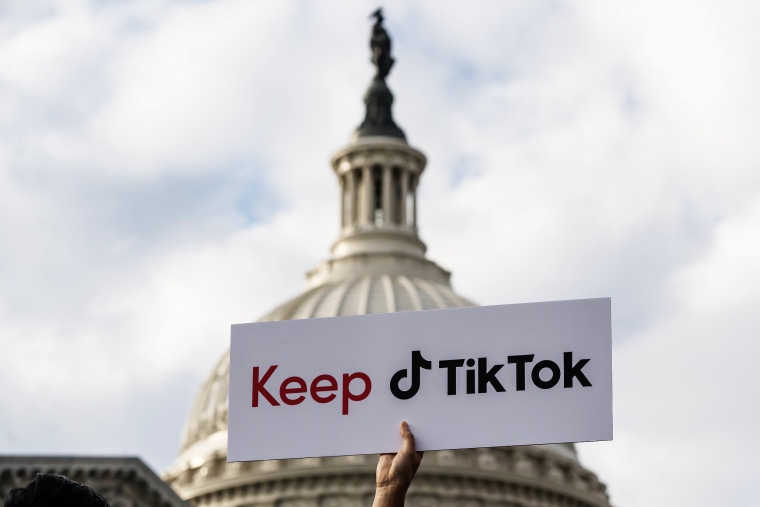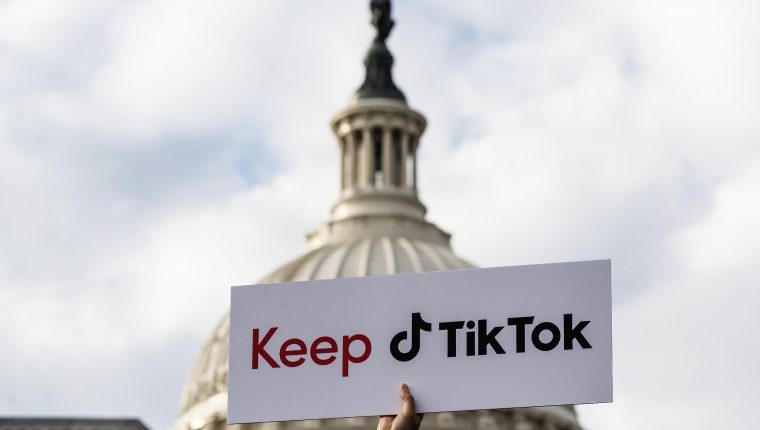TikTok is suing the United States government in an effort to stop enforcement of a bill passed last month that seeks to force the app’s Chinese owner to sell the app or have it banned.
The lawsuit, filed Tuesday in the U.S. Court of Appeals for the D.C. Circuit, argues that the bill, the Protecting Americans from Foreign Adversary Controlled Applications Act, violates constitutional protections of free speech.
The suit calls the law an “unprecedented violation” of the First Amendment.
“For the first time in history, Congress has enacted a law that subjects a single, named speech platform to a permanent, nationwide ban,” TikTok wrote in the lawsuit, “and bars every American from participating in a unique online community with more than 1 billion people worldwide.”
The company argues that invoking national security concerns is not a sufficient reason for restricting free speech, and that the burden is on the federal government to prove that this restriction is warranted. It has not met that burden, the lawsuit stated.
The Department of Justice did not immediately respond to a request for comment. A White House spokesperson directed a request for comment to the Justice Department.
The lawsuit, which had been anticipated since President Joe Biden signed the bill on April 24, is expected to add to an already lengthy timeline for a potential ban or sale of the app. ByteDance, TikTok’s Chinese owner, already had more than a year to make a move. Now, legal proceedings will pause that timeline, meaning it could be years before a ban goes into effect.
Tuesday’s lawsuit is the latest development in what has become a multi-year effort by the U.S. government to effectively ban TikTok. Efforts to rein in the popular video-sharing app have persisted since 2020 under both the Trump and Biden administrations. The federal government and dozens of states have already banned the use of TikTok on government-owned devices.
The lawsuit states that Congress has not offered any evidence suggesting that TikTok poses the types of data security risks or foreign propaganda spread that “could conceivably justify” the law, and has failed to prove that the app poses any specific harm in these areas.

“The statements of congressional committees and individual Members of Congress during the hasty, closed-door legislative process preceding the Act’s enactment confirm that there is at most speculation, not ‘evidence,’ as the First Amendment requires,” the lawsuit states.
TikTok further claims the law violates the right to due process under the Fifth Amendment and is an unconstitutional bill of attainder — or a legislative act declaring a party guilty of a crime, and imposing a punishment for it, without trial.
“Congress has never before crafted a two-tiered speech regime with one set of rules for one named platform, and another set of rules for everyone else,” it stated in the lawsuit.
The lawsuit also states that the law is effectively a ban on TikTok, and that Bytedance’s option to divest is “illusory” because it is not commercially, technologically or legally possible, especially within the 270 days outlined by the law.
“According to its sponsors,” the lawsuit stated, “the Act is not a ban because it offers ByteDance a choice: divest TikTok’s U.S. business or be shut down. But in reality, there is no choice.”
If the law remains in place, the lawsuit stated, it would enable the federal government to invoke national security and force the publishers of other platforms, including news sites, to sell or be shut down.
Gautam Hans, an associate clinical professor of law at Cornell University and associate director of its First Amendment Clinic, said in an email statement that overcoming widespread congressional support for this law may prove difficult for TikTok.
“TikTok has prevailed in its previous First Amendment challenges, but the bipartisan nature of this federal law may make judges more likely to defer to a Congressional determination that the company poses a national security risk,” Hans said. “Without public discussion of what exactly the risks are, however, it’s difficult to determine why the courts should validate such an unprecedented law.”
This is a developing story. Please check back for updates.
Source: | This article originally belongs to Nbcnews.com










